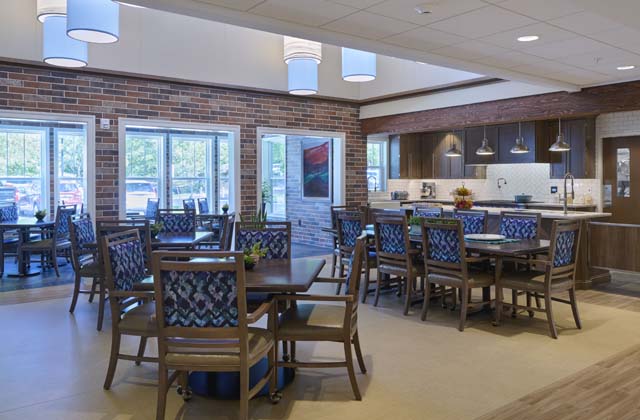Top Reasons to Choose Personalized Memory Care Over Generic Services
Top Reasons to Choose Personalized Memory Care Over Generic Services
Blog Article
Everything About Memory Treatment Services: Why Tiny Memory Care Residences Are an Excellent Selection
Memory care services play a necessary function in supporting people with Alzheimer's and dementia. Small memory treatment homes attract attention for their individualized method and intimate setup. With lower staff-to-resident ratios, these homes cultivate stronger links and customized treatment. Homeowners gain from improved social communications and a risk-free environment. As family members check out choices, comprehending the special advantages of tiny memory care homes ends up being important. What variables should be thought about when selecting the best home?
Comprehending Memory Treatment Solutions
While numerous might know with general elderly treatment choices, comprehending memory care solutions is important for family members dealing with the obstacles of cognitive decline. Memory treatment specifically satisfies people with conditions such as Alzheimer's illness and other types of dementia. These services give a structured setting that concentrates on boosting the quality of life for residents via specialized care and support.Memory care centers are made to guarantee security and protection, typically including protected atmospheres to protect against wandering. Trained personnel are readily available all the time to assist with everyday tasks, medication management, and personal care. Furthermore, memory treatment programs frequently include cognitive stimulation activities, tailored to involve homeowners and advertise psychological well-being. Family members can gain from recognizing these solutions, as they allow educated choices regarding their liked ones' care, making sure that their details needs and choices are dealt with in a caring and helpful way.
The Advantages of Small Memory Care Homes
Small memory care homes supply distinctive advantages that can substantially boost the top quality of life for homeowners with cognitive impairments. One considerable benefit is the intimate environment, which permits customized communications among staff and residents. This smaller sized setting promotes meaningful relationships, reducing sensations of seclusion and anxiousness frequently experienced by people with memory issues.Additionally, the reduced staff-to-resident ratio in tiny memory treatment homes enables caregivers to offer even more alert guidance and assistance. This technique not just improves safety however also promotes a feeling of safety for the residents.Moreover, tiny memory treatment homes can adapt swiftly to the unique demands and choices of each local, permitting for an extra homelike atmosphere. Such an environment can motivate social interaction and involvement in tasks, eventually improving the day-to-day experiences of those coping with cognitive disabilities.
Personalized Treatment Plans for Locals
Personalized treatment plans are crucial in memory treatment homes, as they satisfy the one-of-a-kind needs and choices of each resident. These strategies begin with comprehensive analyses carried out by competent experts, who examine cognitive abilities, medical background, and personal rate of interests. This customized method warranties that care is not just reliable yet additionally respectful of each individual's dignity and autonomy.Moreover, individualized treatment plans are adaptable, allowing modifications as homeowners' needs evolve gradually. This adaptability fosters a feeling of safety and security and familiarity, which is crucial for individuals living with memory difficulties. Caretakers are trained to execute these strategies continually, providing support that straightens with the residents' routines and preferences.Ultimately, customized treatment plans improve the lifestyle for citizens by advertising wellness, independence, and engagement, making them a fundamental aspect of memory care solutions in little memory treatment homes.
Producing a Home-Like Atmosphere
Producing a home-like atmosphere is vital for cultivating convenience and experience in memory care setups, as it greatly influences citizens' emotional health. Small memory care homes frequently focus on customized touches, such as cozy color palettes, family members images, and familiar furnishings plans, which help citizens feel a lot more comfortable. Integrating components reminiscent of a traditional home, like relaxing space and communal locations, urges a sense of belonging.Moreover, making use of all-natural light and outdoor areas can enhance the atmosphere, advertising relaxation and peace. Team member play a significant role in preserving this atmosphere by engaging with citizens in a caring manner, treating them like household. Regular tasks, such as cooking or gardening, can also add to a home-like feel, supplying opportunities for residents to take part in purposeful experiences. Generally, creating a nurturing atmosphere supports cognitive feature and psychological stability, making it a crucial aspect of memory care services.
Boosted Social Interaction and Area
Boosted social communication and community are crucial components of memory care services. By fostering customized social interaction and developing a see this here family-like ambience, these services promote significant links amongst citizens. Team events and activities further motivate participation, helping individuals feel much more consisted of and sustained.
Customized Social Interaction
While social communication is crucial for overall wellness, numerous individuals with memory impairments typically battle to engage meaningfully with others. Individualized social interaction in memory care homes addresses this difficulty by developing customized tasks that provide to locals' special rate of interests and capabilities. By concentrating on specific preferences, caregivers can promote connections that reverberate deeply with each individual. Tasks such as art treatment, songs sessions, and assisted discussions advertise cognitive stimulation and psychological expression. Furthermore, little team settings encourage friendship and allow for more intimate interactions, boosting sensations of belonging. This strategy not just battles feelings of seclusion however additionally empowers citizens to maintain a sense of identification, ultimately adding to enhanced mental health and wellness and high quality of life.
Family-like Ambience
In a memory treatment setup, cultivating a family-like environment considerably enhances social interaction and constructs a sense of neighborhood among citizens. Smaller sized memory care homes typically focus on intimate atmospheres, permitting locals to create closer connections with one another and team member. This nurturing environment advertises trust, which is crucial for people with memory impairments. Citizens are more probable to talk and share experiences, creating an encouraging network that reduces feelings of isolation. The familiarity of common spaces and routines contributes to a sense of belonging, better encouraging social communication (personalized memory care). In such settings, psychological bonds thrive, leading to enhanced total well-being and a greater top quality of life for locals as they browse their day-to-day experiences together
Group Activities and Events

Security and Safety And Security Attributes in Tiny Homes
Many tiny homes created for memory treatment include necessary safety and security and safety functions to guarantee the health of locals. These homes frequently utilize protected entry and leave factors to prevent wandering, a common concern amongst people with memory impairments. Additionally, security systems and alarm devices enhance surveillance, ensuring that team can quickly reply to any kind of uncommon activities.Interior formats are customized for safety and security, with minimized risks such as sharp corners and clutter-free paths. Handrails and non-slip floor covering are usually installed to minimize the threat of drops. Personnel are trained in emergency situation protocols, ensuring they are prepared for different situations.Moreover, personalized treatment plans might consist of evaluation of specific security needs, giving tailored remedies for every homeowner. Overall, these security and security functions develop a caring atmosphere where residents can prosper while maintaining their self-respect and self-reliance.
Just how to Pick the Right Memory Care Home
Exactly how can family members assure they pick one of the most appropriate memory care home for their liked ones? The decision requires careful factor to consider of several aspects. Initially, families need to examine the center's staff certifications and training, making certain that caretakers are experienced in managing memory-related conditions. Next, it's crucial to examine the home's atmosphere, concentrating on safety and security functions and whether it fosters a sense of area and belonging. Seeing the facility can offer insight into day-to-day activities and the social atmosphere, which are necessary for psychological stimulation and emotional well-being. Additionally, family members need to ask concerning the care plans provided, guaranteeing they are customized to private demands. Considering the home's area and availability for household check outs can add to a smoother shift. By addressing these elements, families can make an enlightened choice that prioritizes their liked one's comfort and top quality of life in a memory care setup.
Often Asked Inquiries
What Credentials Should Team Members in Memory Treatment Residences Have?
Team participants in memory treatment homes ought to possess relevant qualifications, experience in dementia treatment, strong interaction abilities, and compassion. Continuous training in behavioral administration and therapeutic interventions boosts their capacity to support homeowners efficiently.
Just How Do Memory Care Solutions Differ From Standard Assisted Living?
Memory care services focus especially on people with memory impairments, giving specialized support and organized settings. On the other hand, standard assisted living provides basic help with day-to-day tasks, lacking the tailored technique essential for those with cognitive challenges.
What Kinds of Tasks Are Offered in Memory Care Houses?
Memory care homes typically use a selection of tasks created to engage residents. Typical choices consist of art treatment, songs sessions, cognitive games, workouts, horticulture, and gatherings, all targeted at enhancing wellness and cognitive feature.
Can Citizens Bring Their Own Valuables to Memory Care Residences?
Locals can commonly bring their own items to memory treatment homes, permitting them to personalize their space - personalized memory care. This technique assists produce a familiar setting, advertising convenience and a sense of identity for the individuals

Exactly How Are Family Members Members Included in the Treatment Process?
Household participants play a vital role in the treatment procedure, usually participating in decision-making, attending treatment meetings, and providing psychological assistance. Their participation fosters a collective atmosphere, boosting the citizen's total well-being and quality of life. While many may be acquainted with basic elderly care options, understanding memory treatment solutions is necessary for households facing the difficulties of cognitive decline. These services provide an organized atmosphere that concentrates on boosting the high quality of life for locals via specialized treatment and support.Memory care centers are made to assure safety and safety and security, commonly featuring protected atmospheres to avoid straying. more information Customized care strategies are important in memory treatment homes, as they cater to the unique requirements and choices of each citizen. Staff participants in memory care homes must possess appropriate certifications, experience in mental deterioration care, solid communication skills, and concern. Memory treatment solutions concentrate especially on people with memory impairments, offering specific support and structured settings.
Report this page